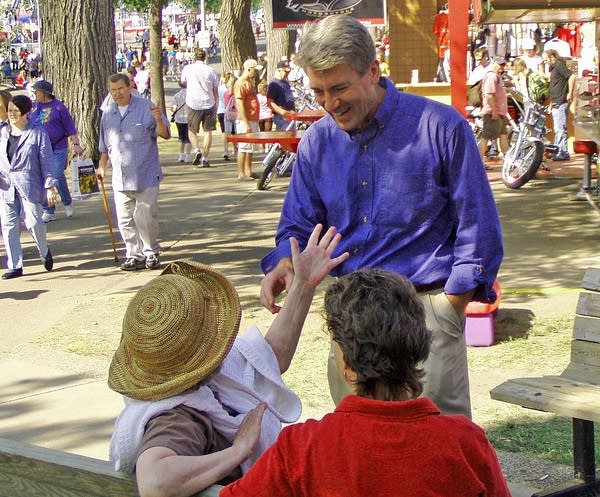Gov. candidates tout their 'country' credentials
Go Deeper.
Create an account or log in to save stories.
Like this?
Thanks for liking this story! We have added it to a list of your favorite stories.

Seven of the top DFL candidates for governor live in the metro area, but it's safe to say that they're emphasizing their ties -- however tenuous -- to rural Minnesota to attract more support.
Take DFL House Speaker Margaret Anderson Kelliher. Her legislative district covers the tony Kenwood neighborhood and the bustling Uptown of Minneapolis. Her district includes the Walker Art Center, Blake School, and dozens of hip urban coffee houses and night clubs.
So where did she kick off her campaign? Two hours south of the City of Lakes, standing next to tractors and other equipment on the farm where she grew up, outside of Mankato.
"Our farm is still here because we came together as a family to face the challenges. As Minnesotans, we must come together to face the challenges," Kelliher said during her campaign kickoff.
Turn Up Your Support
MPR News helps you turn down the noise and build shared understanding. Turn up your support for this public resource and keep trusted journalism accessible to all.
Then there's Matt Entenza. He lives in St. Paul, near the liberal enclave of Macalester College. But instead of touting his life in the Capital City, he talks about his early days in corn country in southwestern Minnesota.
"The reason why I'm running for governor starts with where I grew up, because I finished school in Worthington, Minnesota, in a small town on the prairie that every day struggles to get by," Entenza said.

The 2010 campaign for governor is a rural renaissance for the DFL candidates. Since so many represent Minneapolis and St. Paul, the contenders are going out of their way to convince delegates from Greater Minnesota that they have some rural roots.
Paul Thissen, who grew up in Bloomington and now lives blocks away from Lake Harriet in Minneapolis, focuses on a Blooming Prairie farm in a web video.
"My ancestors came to this state in the 1860s, settling in western Minnesota. And my family still owns this farm, which my dad grew up on and which my grandparents settled 80 years ago during the Great Depression," the video said.
Minneapolis Mayor R.T. Rybak was born and raised in Minneapolis. He worked as a reporter for the Star Tribune and served as development director for a downtown business group before he became mayor. But when it comes to his campaign announcement, he tried to project a more rustic image.
"My relatives were a part of that wave of Bohemian immgrants who came here, and they set out to the town of what's now New Prague," said Rybak. "They opened up the general store there in New Prague. That was my great grandparents' store."

The focus on rural Minnesota isn't an accident, said political scientist Joe Kunkel of Minnesota State University Mankato. Kunkel said it's a long-held political strategy to show rural voters that you can relate to their struggles, especially in an economic downturn.
"When it comes to the endorsing convention, every vote is going to count. And if she can get some extra votes where she originates from, that would be good," said Kunkel. "So I think they're trying to establish a base, and try to show that they're not just city dwellers, and understand and are connected to the outstate areas."
At least one of the rural DFLers running for governor isn't letting his metro competitors get away with attempts to go country.
"I'm the only person up here that stayed in rural Minnesota. I didn't let the bright lights of Duluth lure me away," said Rep. Tom Rukavina, a DFLer from the Iron Range town of Virginia, in a recent debate. "I went back home, and you know what? I had to work hard for a living. I wanted to raise my kids near their grandparents."

The other rural DFL candidate, Tom Bakk of Cook, didn't attend that debate.
Democrats aren't the only ones putting on rhetorical straw hats and bib overalls. Republican candidate Marty Seifert of Marshall also harkens back to the family farm.
"I was raised on a hog farm in southern Minnesota, and one of my jobs was castrating pigs when I was growing up," Seifert said. "You're wondering what this has to do with anything? I'm the only candidate who has firsthand experience cutting pork."
Seifert hopes that his message resonates with voters, and he becomes the first non-metro governor since Rudy Perpich left office in 1991.



